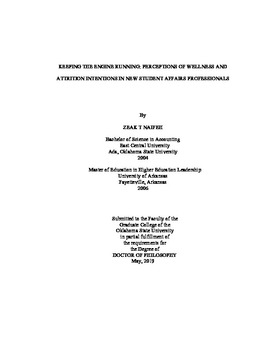| dc.contributor.advisor | Kearney, Kerri | |
| dc.contributor.author | Naifeh, Zeak Thomas | |
| dc.date.accessioned | 2019-10-25T19:51:40Z | |
| dc.date.available | 2019-10-25T19:51:40Z | |
| dc.date.issued | 2019-05-01 | |
| dc.identifier.uri | https://hdl.handle.net/11244/321563 | |
| dc.description.abstract | New student affairs professionals play a crucial role in the ever-changing higher education landscape by serving on the front-lines of programs and services for students. At any given time, new professionals make up almost 20% of all student affairs professionals. Despite the critical nature of their roles, and their desires to serve students, studies have estimated that between 50% and 60% of new student affairs professionals leave the field within the first five years. | |
| dc.description.abstract | The purpose of this quantitative study was to examine the relationship between wellness and reported intent to leave the field for new student affairs professionals, defined as those in their first five years in the student affairs profession. Set against the backdrop of an objectivist epistemology and post-positivist theoretical perspective, the 5F-WEL instrument was used within a cross-sectional survey design to better understand respondent wellness-related behaviors and beliefs. A sample of 401 respondents, associated with NASPA, ACPA, NODA, and NIRSA, was used to examine if wellness impacted attrition intention, and if personal, work, and institutional characteristics impacted wellness levels in new student affairs professionals. Data analysis occurred in four phases: descriptive, correlation, analysis of variance, and multiple regression. | |
| dc.description.abstract | Although the career paths and experiences of new student affairs professionals differ from individual to individual, results of data analysis revealed a common theme: Wellness can impact their intentions to leave the field of student affairs, and their individual characteristics and beliefs can influence their wellness levels. As self-reported wellness levels increased in new professionals, reported attrition intention decreased. Results also demonstrated that personal, work, and institutional characteristics impacted wellness at both the macro level (overall wellness) as well as the micro level (wellness factors comprising overall wellness). As the landscape of higher education continues to shift and change, the role wellness plays in the retention of new student affairs professionals becomes increasingly important, both to individuals and institutions. The wellness of new student affairs professionals is vital to institutions, and to student growth and development as new professionals continue to provide the programs and services moving institutions forward. | |
| dc.format | application/pdf | |
| dc.language | en_US | |
| dc.rights | Copyright is held by the author who has granted the Oklahoma State University Library the non-exclusive right to share this material in its institutional repository. Contact Digital Library Services at lib-dls@okstate.edu or 405-744-9161 for the permission policy on the use, reproduction or distribution of this material. | |
| dc.title | Keeping the Engine Running: Perceptions of Wellness and Attrition Intentions in New Student Affairs Professionals | |
| dc.contributor.committeeMember | Wanger, Stephen P. | |
| dc.contributor.committeeMember | Bird, Lee E. | |
| dc.contributor.committeeMember | Ormsbee, Christine | |
| osu.filename | Naifeh_okstate_0664D_16113.pdf | |
| osu.accesstype | Open Access | |
| dc.type.genre | Dissertation | |
| dc.type.material | Text | |
| dc.subject.keywords | attrition | |
| dc.subject.keywords | holistic wellness | |
| dc.subject.keywords | new professionals | |
| dc.subject.keywords | student affairs | |
| dc.subject.keywords | wellness | |
| thesis.degree.discipline | Educational Leadership and Policy Studies | |
| thesis.degree.grantor | Oklahoma State University | |
